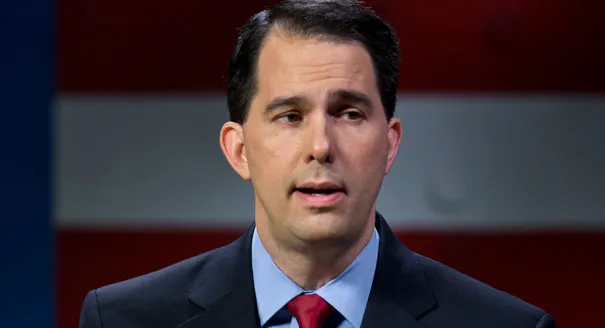A ‘Desperate Rearguard Action’ by a Forced-Unionism Partisan


Government union bosses haven't been able to overturn Scott Walker's Act 10, which sharply restricts their compulsory-unionism privileges, at the ballot box. But they are still hoping to do so in the courts.
On September 14, according to innumerable credulous media accounts, Dane County Circuit Judge Juan Colas finally accomplished for Big Labor what union operatives had previously failed to do in state and federal court and in a series of “recall” elections, including one this June targeting GOP Gov. Scott Walker. Colas, the breathless reports inform the public, has effectively scuttled Act 10, a law adopted in early 2011 that protects teachers and most other state and local public servants in Wisconsin from being fired for refusal to pay union dues or fees as a job condition, and also sharply restricts the scope of most government officials’ monopoly-bargaining privileges.
To reach his decision overturning most of Act 10 as it pertains to K-12 teachers and other county and city employees, Colas had to dance around a host of federal precedents indicating that states have the prerogative under the U.S. Constitution to bar forced union dues and restrict government union bosses’ monopoly-bargaining power, and specifically that such restrictions do not violate the First or Fourth Amendments. The result is apt to be persuasive only to dyed-in-the-wool supporters of monopolistic unionism. In the Wall Street Journal’s Political Diary today, commentator Allysia Finley eviscerated the Colas opinion in just two paragraphs:
Judge Colas’s opinion is an exercise in legal acrobatics. He stretches and twists case law to explain why the governor’s reforms limiting collective bargaining are unconstitutional, even while he acknowledges that “it is undisputed that there is no constitutional right to collective bargaining.” He concludes that the law violates employees’ freedom of association and free speech by restricting collectively bargained wage increases for unionized workers and opines that such a limitation discourages workers from joining a union. But of course, that’s not the same thing as abridging their right to do so.
The judge also rules that the law contravenes the U.S. Constitution’s equal protection clause by treating union and non-unionized employees differently. But as the state argues, workers by their own volition choose which class they belong to. And at any rate, as the judge notes, courts usually uphold a “statute challenged on equal protection grounds ‘if a rational basis supports the legislative classification.'” But then he summarily dismisses the state’s rationale as inadequate, which is really a matter of opinion, not law.
Practically as soon as Colas issued his opinion at 4:50 PM on Friday afternoon, Gov. Walker and Wisconsin Attorney General J.B. Van Hollen announced the state would appeal the ruling and ask the court to issue a stay until the state Supreme Court upholds it or, far more likely, overturns it. The state has an excellent chance of prevailing, if decades of court precedents upholding state restrictions on union monopoly bargaining and forced-union dues matter at all. Moreover, just a few months ago a federal court specifically ruled that Wisconsin was within its rights to prohibit compulsory unionism for most types of public servants while allowing it for others, as Act 10 does.
In his assessment of Friday’s ruling in Wisconsin, appearing today on the Point of Law Internet forum, legal writer Adam Freedman blasts Colas’s opinion as a “desperate rearguard action” by a Big Labor ally. (See the link above.) Freedman’s words are harsh, but in view of the shoddy reasoning Colas uses to reach his favored conclusion, they seem apt.

